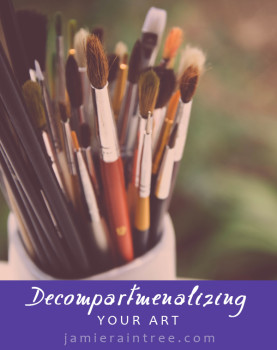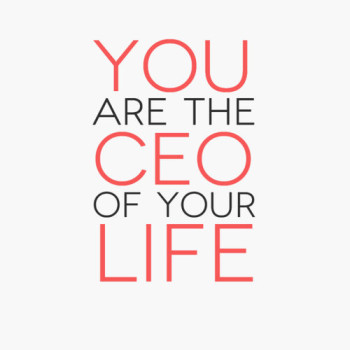 This month I’m coming to the end of my Artist’s Way journey and my prolonged jaunt through Julia Cameron’s creative mind. I have to say, what Julia and other “recovering artists” have promised was true–I have been a more productive artist than ever since I started working through this book in September. (Consider this another recovering artist’s testimonial for those who have yet to be converted.)
This month I’m coming to the end of my Artist’s Way journey and my prolonged jaunt through Julia Cameron’s creative mind. I have to say, what Julia and other “recovering artists” have promised was true–I have been a more productive artist than ever since I started working through this book in September. (Consider this another recovering artist’s testimonial for those who have yet to be converted.)
This morning I read the section on accepting that you are an artist (the beginning of Chapter 11 if you have a copy) and I felt a sense of deep resonance with her words. Julia says, “I am an artist. As an artist, I may need a different mix of stability and flow from other people.” And, “As an artist, I must be very careful to surround myself with people who nurture my artist–not people who try to overly domesticate it for my own good.” And, “As an artist, I can literally die from boredom. I kill myself when I fail to nurture my artist child because I am acting like somebody else’s idea of an adult.”
Seriously, being an adult is overrated anyway.
The Art of Being Different
I could really quote the whole section because it’s all genius but it suffices to say that she has written an ode to how people who identify themselves as artists are just different. I felt such a longing as I read the words, because I wished so badly that I could be accepted as an artist by everyone in my life–as someone who might not always be the modern, buttoned-up wife, mother and businesswoman. I wished to be accepted as someone who might get overly emotional at times, or be late dropping my daughters off at school, or might live in my pajama for two days straight, talking to no one as I tried to capture an emotion simmering beneath the surface. I fantasize of living in a world where they would say, “Oh, she’s an artist. Just leave her be,” and they would love and accept me for exactly who I was.
But as I thought about it I realized, I could hardly expect people to accept me in all my raw, disheveled-ness, when I haven’t–as Julia says–fully accepted myself as an artist. I don’t accept my own rawness. I am inconsistent, and I fall into dark places at times, and I get obsessed with weird things. I don’t like being told what to do and I long for nature like a lost lover. Sometimes these things don’t mesh well with modern life and I have a hard time forgiving myself for that, as programmed as women are these days to be everything to everyone and to never let them see your cracks.
Acceptance From Others vs. Acceptance From Yourself
I know so many people who will not admit to others that they are an artist (as if they could ever pretend to be anything else). They call themselves stay-at-home moms or unemployed. They cling to their day job that they usually don’t love because it’s easier to define. They hold their artistry close to their chest for fear of being judged for what they love to do, or worse, who they are.
On the other hand, there are people, like me, who live denying “real life” because living in the creative parts of the mind feels safer, more accepting. I often hide away from family, friends, jobs, and sometimes even my own children to take the pressure off of having to be responsible and put on a brave face for the world.
I keep expecting to be an artist while my kids nap, then a typical mother and wife the rest of the time.
But being an artist is a way of life. It colors how we look at and approach the world. We can’t lock away that part of ourselves, and if we try to, we’re only kidding ourselves. We’re only creating a deep rift inside ourselves that keeps us from living authentically.
The Integration of Art and Life
Lately I’ve been cooking a lot more. Up until now, I have always hated cooking. With a passion. It felt like a distraction from all the things I would rather be doing, but for health reasons, it has become a high priority to create nutritious meals from scratch. I had resisted this lifestyle change for years–YEARS–but once I finally accepted that if I didn’t change my ways, I wouldn’t be able to do all the other things I loved, cooking quickly became a creative outlet for me. Mixing things together and testing out combinations felt like an art–the results my mini-masterpieces (however short lived). I brought my artistry and inquisitive mind to cooking, and the cooking brought more energy and a clearer mind to my writing.
 I love the saying, “Be the CEO of your life.” I love the perspective change this concept creates. The idea is that no matter what you do–even if you work for someone else–you should approach every aspect of your life as cogs working together toward your own total fulfillment. It means taking responsibility for how you feel in each waking moment and making the decisions required to live at your most impassioned every day.
I love the saying, “Be the CEO of your life.” I love the perspective change this concept creates. The idea is that no matter what you do–even if you work for someone else–you should approach every aspect of your life as cogs working together toward your own total fulfillment. It means taking responsibility for how you feel in each waking moment and making the decisions required to live at your most impassioned every day.
I think being the creative soul of your life is the same. You must first accept that you are an artist. And then you must be brave enough to live that decision when you’re being a mom, or a dad, or a wife, or a girlfriend, or a daughter, or a son, or an employee, or a student. If you truly want to live a fulfilled life, you have to unpack that part of yourself and allow it to permeate every aspect of your being.
So don’t “domesticate” yourself.
The box is already leaking, whether you realize it or not.
I love The Artist’s Way. Though I probably need to read it again because for whatever reason, life lessons are easily forgotten. I’ve gotten better at accepting myself as an artist and writer, but I am still hesitant to claim it with certain people. Well, acceptance doesn’t seem to come overnight most of the time. It comes in stages. At least for me.
I agree–I often forget the lessons I’ve learned and need reminders. This will be one of those books to keep close at hand! And yes, acceptance takes time, as with any personal growth. Just have to keep working on it little by little. 🙂